Archived Fire Damage Blog Posts
Tips to Avoid Fire Damage in Colorado Springs, CO
7/22/2024 (Permalink)
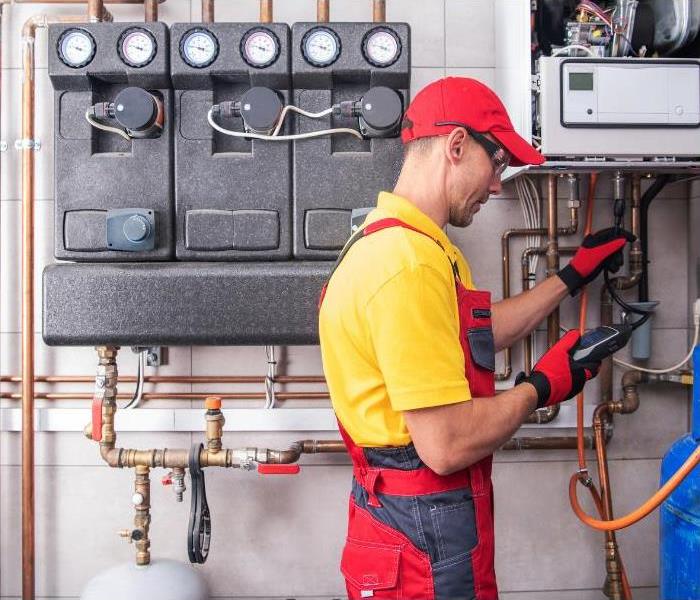 Fire Damage Prevention Tips for Colorado Springs, CO
Fire Damage Prevention Tips for Colorado Springs, CO
Fire damage can be devastating, not only causing property loss but also endangering lives. In Colorado Springs, CO, where dry conditions and varying weather patterns can increase fire risks, taking proactive steps to prevent fires is crucial. Whether you're a homeowner, business owner, or property manager, implementing fire prevention measures can significantly reduce the likelihood of a fire and protect your property. Here are essential tips to help you avoid fire damage in Colorado Springs:
1. Install and Maintain Smoke Alarms:
Smoke alarms are your first line of defense against fires. Install smoke alarms on every level of your home or business, inside each bedroom, and outside sleeping areas. Test alarms monthly and replace batteries annually to ensure they are working properly.
2. Create a Fire Escape Plan:
Develop and practice a fire escape plan with your family or employees. Identify at least two exits from every room and establish a meeting place outside. Regularly review and update the plan to accommodate any changes in your property layout or occupancy.
3. Inspect Electrical Systems Regularly:
Faulty wiring and electrical equipment are common causes of fires. Have a qualified electrician inspect your electrical system at least once every few years, especially in older buildings or if you notice flickering lights, tripping breakers, or other signs of electrical issues.
4. Use Appliances Safely:
Appliances such as stoves, ovens, dryers, and heaters can pose fire risks if not used properly. Follow manufacturer's instructions for installation and maintenance. Keep flammable materials away from heat sources and unplug appliances when not in use.
5. Properly Dispose of Smoking Materials:
If you smoke, use deep, sturdy ashtrays and ensure cigarettes are completely extinguished before disposal. Never smoke in bed or leave smoking materials unattended. Consider implementing a designated smoking area away from buildings.
6. Keep Flammable Materials Secure:
Store flammable liquids, such as gasoline, propane, and paint, in well-ventilated, designated areas away from heat sources and sparks. Use approved containers and follow local regulations for storage and disposal.
7. Maintain Heating Systems:
Furnaces, chimneys, and heating systems should be inspected and cleaned annually by professionals. Clear debris and combustible materials from around heating units, and never use extension cords or overload outlets with heating appliances.
8. Practice Safe Cooking Habits:
Cooking fires are a leading cause of home fires. Stay in the kitchen when cooking, and keep flammable materials like towels and curtains away from the stove. Use a timer to remind yourself of food cooking on the stove or in the oven.
9. Monitor Open Flames:
Candles, fireplaces, and outdoor fires should be attended at all times. Use sturdy candle holders and place candles on stable surfaces away from curtains, bedding, and other flammable materials. Install spark arrestors on chimneys to prevent sparks from escaping.
10. Educate and Train Residents or Employees:
Provide fire safety education and training to everyone in your household or workplace. Ensure they know how to use fire extinguishers and when to evacuate safely. Encourage a culture of fire safety and awareness.
11. Install Fire Suppression Systems:
Consider installing fire sprinkler systems or other fire suppression systems, especially in larger buildings or areas prone to fire hazards. These systems can significantly reduce fire damage and help contain fires before they spread.
12. Stay Informed About Fire Risks:
Pay attention to local fire weather warnings and fire restrictions issued by authorities. During high-risk periods, take extra precautions and limit activities that could start a fire outdoors.
By implementing these fire prevention tips in Colorado Springs, CO, you can significantly reduce the risk of fire damage to your property and ensure the safety of your loved ones or employees. Prevention and preparedness are key to minimizing the impact of fires, making it essential to stay vigilant and proactive in fire safety practices. Protect what matters most by taking action today to prevent fires tomorrow.
Five Leading Causes of Home Fires in Colorado Springs and SERVPRO's Role in Restoration
10/19/2023 (Permalink)
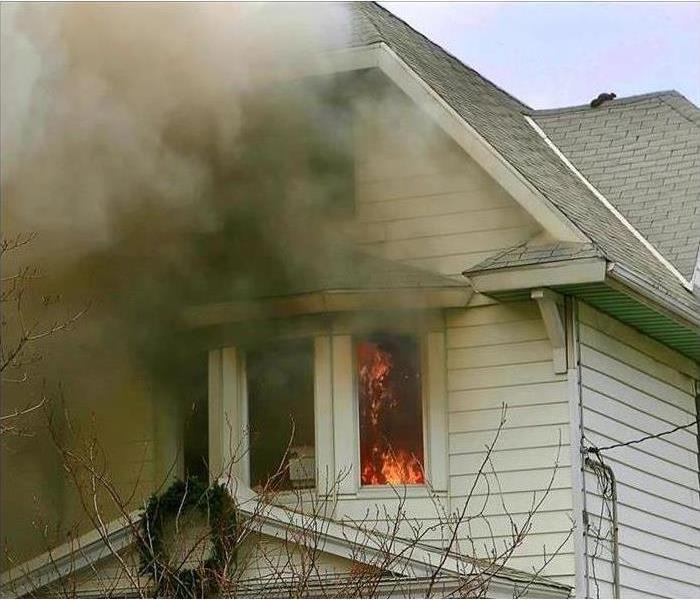 A home on fire in Colorado Springs, CO.
A home on fire in Colorado Springs, CO.
Home fires can be devastating, leading to not only property damage but also putting lives at risk. In Colorado Springs, CO, the risk of home fires is a concern due to various factors, including extreme weather conditions, electrical issues, and human error. In this blog, we will explore the five leading causes of home fires in Colorado Springs and discuss how SERVPRO of East Colorado Springs can play a crucial role in restoring your home and helping you get your life back on track.
5 Leading Causes of Home Fires
- Electrical Issues
Colorado Springs is no stranger to extreme weather conditions, including harsh winters. The use of space heaters, electric blankets, and other electrical appliances increases during these cold months, leading to a higher risk of electrical fires. Overloaded circuits, outdated wiring, and faulty electrical systems can all contribute to fires.
How SERVPRO Can Help: SERVPRO of East Colorado Springs has a team of professionals trained to assess and mitigate fire damage caused by electrical issues. They can quickly restore your property by repairing or replacing damaged wiring, appliances, and electrical systems. This helps you regain your sense of security and comfort in your home.
- Cooking Accidents
Cooking is a common activity in every household, but it also presents one of the leading causes of home fires in Colorado Springs. Unattended stovetops, grease fires, and oven malfunctions can quickly escalate into significant disasters.
How SERVPRO Can Help: In the event of a cooking-related fire, SERVPRO can assist with fire damage restoration. Their professionals are trained to clean and restore areas affected by smoke and soot, including walls, ceilings, and appliances. This thorough cleaning process ensures your kitchen is safe and functional once again.
- Wildfires
Colorado Springs is situated in a region that experiences wildfires, especially during the dry and windy seasons. While wildfires often start in the wildland areas, they can spread to residential neighborhoods, putting homes at risk.
How SERVPRO Can Help: In the aftermath of a wildfire, SERVPRO offers services for restoring homes affected by smoke and fire damage. They can clean and rebuild your property, making it safe and habitable once more. Additionally, their professionals have the expertise to address water damage from firefighting efforts, further protecting your home.
- Smoking Materials
Smoking materials, such as cigarettes and cigars, are another leading cause of home fires in Colorado Springs. Improper disposal of these materials or smoking indoors can lead to fires, especially if flammable materials like upholstery, curtains, or bedding are nearby.
How SERVPRO Can Help: If a fire is started due to smoking materials, SERVPRO's team can assist with cleanup and restoration. They specialize in removing smoke odors and stains, ensuring that your home is free from any lingering traces of the fire.
- Faulty Heating Systems
As temperatures drop in Colorado Springs, the use of heating systems, including furnaces and fireplaces, increases. However, these systems can sometimes malfunction or become a fire hazard if not properly maintained.
How SERVPRO Can Help: SERVPRO can restore your home after a fire caused by a faulty heating system. Their experts can clean, repair, or replace damaged components to ensure your heating system operates safely and efficiently.
SERVPRO's Role in Fire Restoration
SERVPRO of East Colorado Springs plays a pivotal role in helping residents recover from home fires in Colorado Springs. Their comprehensive fire restoration services include:
Assessment and Mitigation: The first step is to assess the extent of the fire damage and take immediate steps to mitigate further damage.
Soot and Smoke Damage Cleanup: SERVPRO professionals use specialized equipment and techniques to clean soot and smoke residues from various surfaces in your home.
Water Damage Restoration: Addressing water damage caused by firefighting efforts or burst pipes is an integral part of their services.
Structural Repairs: SERVPRO can repair or rebuild damaged structural components, ensuring that your home is safe and structurally sound.
Odor Removal: Their experts can effectively eliminate the lingering smoke odor from your home.
Contents Restoration: SERVPRO can restore your personal belongings, such as furniture, electronics, and clothing, that have been affected by the fire.
Home fires are a significant concern in Colorado Springs, and it's essential to understand the leading causes and take steps to prevent them. However, should a fire occur, SERVPRO of East Colorado Springs is ready to step in and help with the restoration process. Their experienced professionals are well-equipped to assess, mitigate, and restore your home, providing you with peace of mind and a fresh start after a devastating fire. By understanding the risks and knowing how to respond, you can better protect your home and loved ones from the threat of home fires in Colorado Springs.
Why Board Up Services Are Necessary After a Fire
8/31/2023 (Permalink)
 Board up home in Colorado Springs, CO, after fire damage.
Board up home in Colorado Springs, CO, after fire damage.
If you’re dealing with the aftermath of a fire in your Colorado Springs, CO, home, there are many steps you need to take to help restore your living space. While you go through the recovery process, it’s important to have board-up services performed on your home to help protect it from further damage. Here are some of the main benefits of having your home boarded up during the fire cleanup process.
Helps Prevent Further Damage
While you’re already dealing with costly fire damage, the last thing you want is for your home to become exposed to additional harm. Failing to have your building boarded up in the aftermath of a fire can make it vulnerable to elements such as:
- High winds
- Water
- Debris
- Animals
Be sure to cover up any holes in your roof or walls by using emergency board-up services in order to keep further damage at bay.
Satisfies Insurance Requirements
In many cases, your insurance company will require you to take reasonable measures to prevent additional harm to your home after a fire. These measures may include board-up or tarp over services. In order to have your insurance claim approved, make sure you have restorative services performed on your home as soon as possible.
Keeps Away Intruders
If your home is left exposed after a fire incident, it can invite intruders to cause further damage. Whether they steal your property or access your private information, home intruders can find many ways to wreak more havoc on your living space. When you have your home boarded up by professional services, you can prevent intruders from entering your home and causing more distress.
Contacting an emergency restoration company to perform board-up services can safeguard your home after a fire incident. It's crucial to take this simple step to protect your living space from any additional forms of damage.
3 Times When Fire Damage May Not Be Covered by Insurance
9/15/2022 (Permalink)
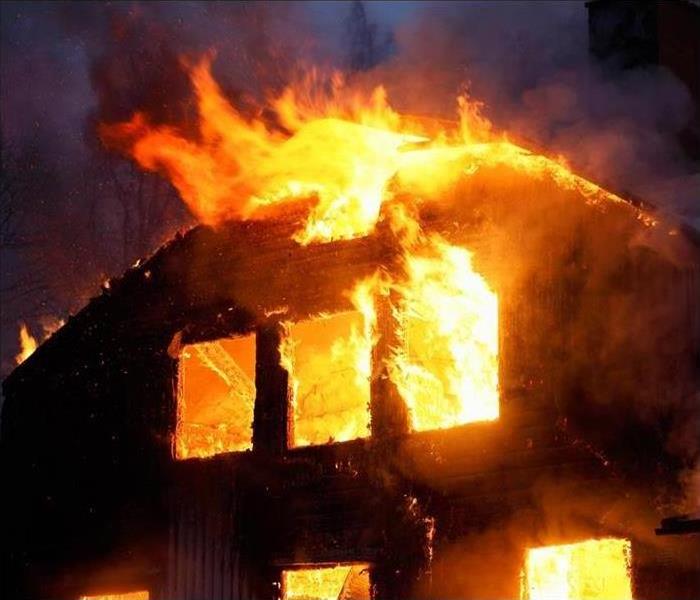 A fire can leave severe damage to your building.
A fire can leave severe damage to your building.
Property insurance usually provides coverage for damage caused by a home fire. However, there are circumstances where most property insurance policies will not cover the damage. These are three of the most common.
3 Most Common Times When Fire Damage May Not Be Covered by Insurance
- The Fire Was Deliberately Set by the Homeowner
Arson is a criminal act where someone deliberately sets fire to their own property or the property of another. Almost all insurance policies exclude coverage for intentional and criminal acts. If you or a member of your household deliberately set fire to your property, then your insurance company will probably deny the claim and you may face criminal prosecution. However, the insurance company has to be able to prove that the fire was started by arson.
- The Fire Was Caused by an Act of War
Most insurance companies also exclude coverage for damage from a home fire that occurs because of an act of war. Fortunately, there are few times when this exclusion would ever come into play. Actions that may be considered acts of war include insurrections, revolutions, invasions, military coups and terrorism. This exclusion exists because of the potential cost of claims and the difficulty involved in computing an appropriate premium to charge.
- The Property Is Vacant
Most insurance policies exclude damage caused by a vacant home fire if the fire was deliberately set. This is because policies exclude damage caused by vandalism or malicious mischief when a building has been vacant for more than 30 days before the loss. However, this provision is a topic of legal debate and whether your insurance company can exclude coverage for fire restoration largely depends on the legal interpretation of the courts in Black Forest, CO.
Most damage from a home fire is covered by property insurance; however, there are times when exclusions may apply. Your insurance company must be able to prove that the damage falls under one of the exclusion clauses in your policy to successfully deny a claim.
The 4-Step Fire Restoration Process
7/18/2022 (Permalink)
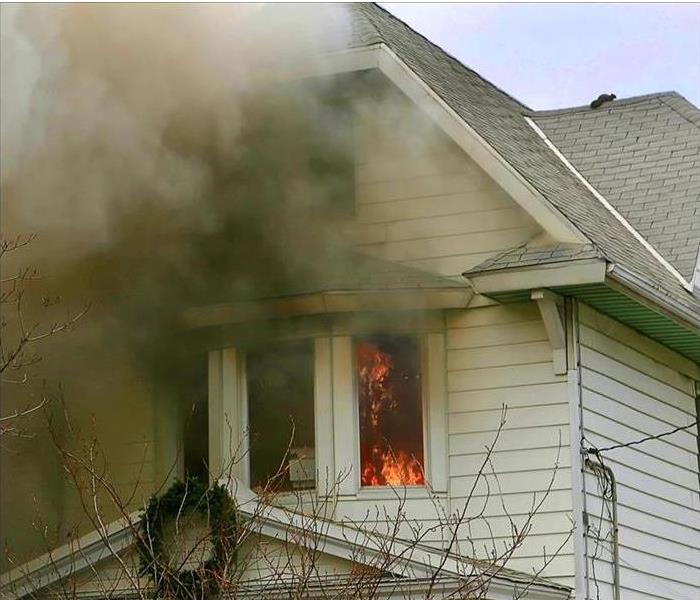 Residential fire damage.
Residential fire damage.
A house fire is not fun, and it can leave many families homeless for weeks or months, depending on the severity of the blaze. A fire restoration service in Black Forest, CO, will strive to get a family back home as quickly as possible, and they do so by adhering to the fundamental four-step restoration process.
4 Steps For Fire Restoration
- Property Assessment
Before a restoration company can provide a timeline for the restoration of your home, it will need to send a team out to assess the fire, water, and smoke damage. The team will walk the property and identify immediate safety concerns as well as structural issues. Do not worry that a significant amount of damage automatically means your house is not salvageable. You might be surprised at what a little elbow grease and construction knowledge can accomplish.
- Mitigation
The fire restoration company will probably suggest using mitigation techniques to ensure no further damage occurs. Most insurance companies do require property owners to protect their property within reason.
The typical services offered by a majority of mitigation contractors are board-ups, tarping, and fence installation. These tools offer the most protection against damage from weather, wildlife, and vandals.
- Cleaning
Before the crew can move onto damage cleaning, they will need to remove any excess water from the house. With the water removed and the space given adequate time to dry, the team will move forward with cleaning and disinfecting the space, likely removing any contaminated elements.
- Restoration
With the property clean, the restoration service will begin the reconstruction process. During this phase, you can see your house turning back into your home. When the team is finished, you might not even realize there was ever a fire.
The fundamentals of fire restoration boil down to an essential four-step process. It is not the job of the homeowner to go through a disaster alone, especially when there are professionals with the expertise to help.
4 Tips for Getting the Most Out of Your Microwave
6/23/2022 (Permalink)
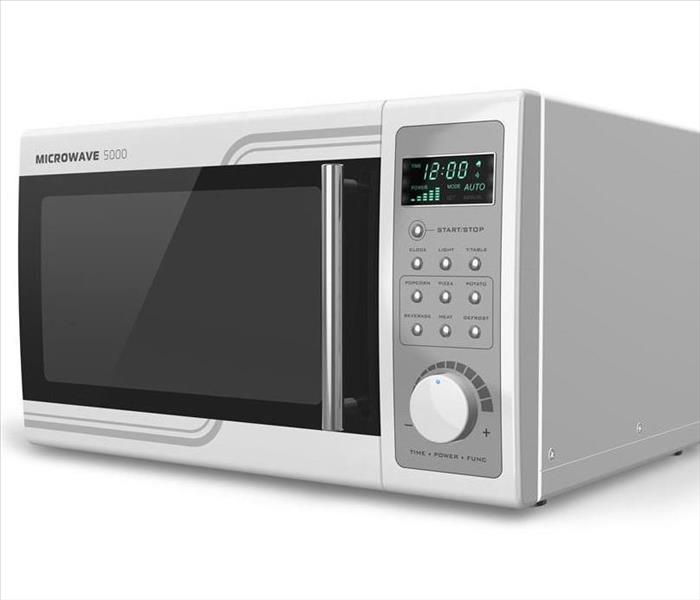 Clean and protect your Microwave with our Tips.
Clean and protect your Microwave with our Tips.
If you are like most people, you probably appreciate all the things that modern appliances do to improve your life. Without your washing and drying machines and your dishwasher, life would be full of more labor. Still, these appliances come with a cost, especially if they are not maintained in a reasonable manner, resulting in consequences such as an unpleasant smoke smell or other lingering odors.
If you enjoy nuking your food from time to time, read on how best to maintain your portable oven.
4 Ways to Love Your Microwave Even More
Your home in Colorado Springs, CO, would not be the same without this fast-cooking appliance. As handy as it is, there are always some things you can learn to make it more valuable to your household.
1. Clean the Filters
Modern microwaves are likely to come equipped with an advanced ventilation system. This is designed among other things to reduce any smoke smell from cooking. Each brand and model is different, but most are likely to have a grease filter. This should be cleaned about once a month.
As with all appliances, follow the instructions in the owner manual. The cleaning of the filter usually involves soaking it in hot water and detergent and then scrubbing it to remove debris. A charcoal filter should be replaced about every six months or so.
2. Avoid Fires
The National Fire Protection Association reports that about 4% of home fires come from microwaves. If you are faced with this type of fire, take the following steps:
A microwave fire in your home can cause all kinds of damage, even a small fire. Soot and smoke damage require trained technicians to remove smells and clean off surfaces. Doing it yourself is likely to result in unsatisfactory results.
3. Clean the Vent Grill
This device, usually located at the top of the appliance, must be clean and clear of obstructions to allow for adequate airflow. For best results, clean this area with appropriate cleaning agents about once a month and also make sure nothing blocks the grill. For best cleaning, the grill should be removed, soaked in hot water and dish soap and then scrubbed clean of materials.
4. Clean the Entire Oven
Over time, the inside of the oven will accumulate food particles and will coat the inside surfaces. This should be cleaned on a regular basis. Failure to do so will result in odors permeating throughout your kitchen. Steam cleaning can be an effective cleaning technique. It involves placing water and some vinegar in a bowl, heating it, and then wiping down the inside of the unit.
By taking care of your oven, you can avoid a fire in your home and reduce any type of smoke smell that comes with its operation. Read the owner's manual, clean the components of the oven and replace items as needed. This will help you get the most out of this handy appliance.
5 Main Culprits of a Home Fire
3/14/2022 (Permalink)
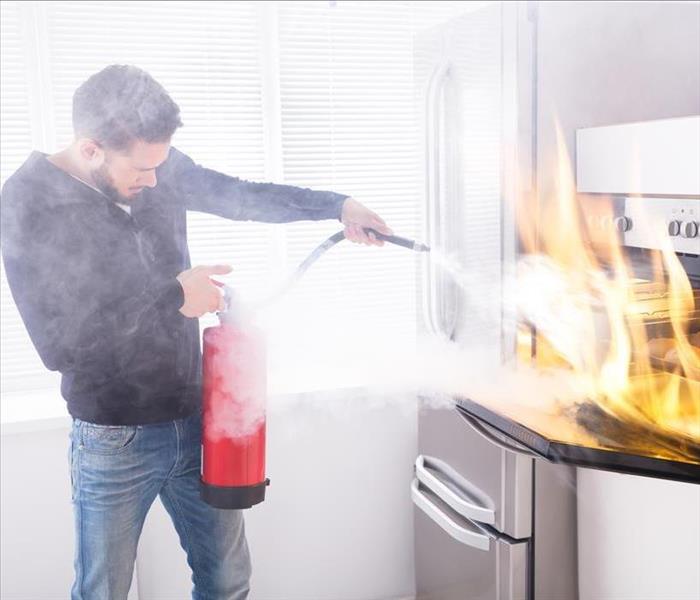 Learn more about the 5 Main Culprits of a Home Fire, and avoid Fire Damage in your Colorado Springs, CO house.
Learn more about the 5 Main Culprits of a Home Fire, and avoid Fire Damage in your Colorado Springs, CO house.
While no one wants a home fire to happen to them, more than 350,000 residential fires happen every year, according to the National Fire Protection Association. To help guard your Colorado Springs, CO home and minimize the need for securing a professional fire restoration company, it’s important to know the top five fire causes.
General Causes of Residential Fires. 1. Cooking
This is the leading cause of fire damage, accounting for almost half of emergency calls. Within this category, cooking left unattended tops the list as a reason for a fire to start. In many cases, the fire itself happens due to grease or oils overheating. Highly flammable, it may even lead to cooking utensils turning into flames. Along with the stovetop and oven, electrical kitchen appliances may also cause a fire to start.
To avoid this from happening, stay in the kitchen while cooking and properly clean cookware and appliances to eliminate excess buildup.
2. Electrical Fires
Another common culprit of a home fire is faulty wiring. Typically, this happens due to malfunctioning equipment. Whenever there are blown fuses, dimming lights or signs of sparks, it is recommended to have a professional check your electrical system or invest in new appliances. Key equipment to keep an eye on include clothes dryers, air conditioners, fans and cooking appliances.
Another way to avoid an electrical fire is to properly use extension cords and surge protectors. Avoid using extension cords together or overloading them to minimize potential risk.
3. Heating Appliances
For people who want to avoid procuring fire cleaning services, regularly inspect furnaces and fireplaces. More importantly, keep a watchful eye when using space heaters. While they may provide needed warmth, they also may heat up combustible materials. Electric heaters may have wiring issues, as well as the capacity to spark a flame if it is too close to items that are easy to catch fire.
Extra precaution should be taken if using a heater that requires fuel to avoid it tipping or leaking.
4. Candles
Along with delightful smells and cozy ambiance, candles may also lead to a fire starting. Again, leaving them unattended is the main reason that happens. When using candles, ensure their wicks are trimmed before lighting and that they are placed in a safe location away from materials that may easily ignite.
5. Chemicals
While more associated with industrial situations, chemicals in a home are also a potential fire starter. From gasoline to oily rags, even the fumes and vapors may lead to a fire. Although less common, these types of fires often burn hotter and faster. To avoid an incident from happening, ensure gas and other chemicals are stored in approved, tightly sealed containers that are labeled. Leave a little room in the container to help keep the vapors from getting out. Keep the container approximately 50 feet away from potential ignitors, ideally outdoors or in a shed away from the home.
A home fire is a devastating event, no matter how small it may be. Taking extra precautions and knowing the top reasons that cause them makes it easier to avoid them.
Understanding Your Fire Insurance Policy
2/23/2022 (Permalink)
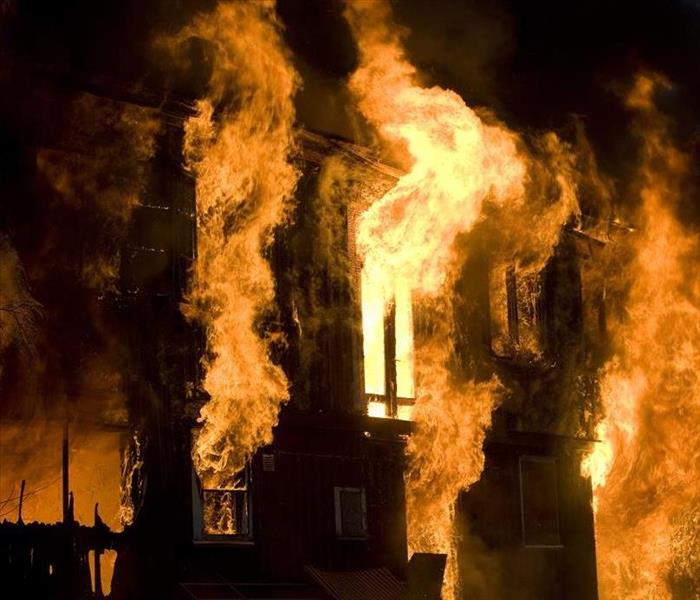 Follow These Tips and learn more about Your Fire Insurance Policy.
Follow These Tips and learn more about Your Fire Insurance Policy.
Fire is a destructive force. A home fire in Colorado Springs, CO, can cause a lot of damage that is expensive to mitigate. Fortunately, if you have good insurance coverage, you probably won't have to pay for those services out of pocket. Most basic homeowners' policies cover the cost of repairs, but there are a few situations in which your provider won't pay for restoration.
Home Fire Coverage Basics
Property coverage is designed to help you handle the fallout of sudden, accidental occurrences that cause damage to your home. An accidental fire can start several ways:
- Overturned candle
- Contact with a space heater
- Electrical short
- Ignited grease
The insurance adjuster looks at a couple of key factors to determine whether damage from a fire is likely to be covered by your policy. First, is the damage due to an accident? Most people don't mean to set their kitchens on fire while cooking, so any issues that result from that situation will probably be covered. Second, did the fire occur suddenly? If you are up-to-date on all your home inspections and no ongoing problem has been found, that typically satisfies your provider that you have done your due diligence in keeping your home safe.
Intentional Fires
One exception that typically results in a claim being denied is the suspicion of arson. If there is a reason to believe that you set the fire to your home intentionally, your insurance company will not cover the cost of repairs. An investigation will be needed if you want to dispute the decision. If you are found at fault for the fire, you will have to pay for the damage out of pocket and will probably face legal ramifications as well.
Wildfire Coverage
Most damage from a home fire starts within the structure itself. A wildfire, however, is an external circumstance that can still put your house in danger. If you live in an area prone to wildfires, your basic homeowners' policy may not cover the cost of remediation or rebuilding if your house is damaged by one. Read over your policy for wildfire exclusions and consult with your insurance agent to go over your coverage options. You may have to purchase additional policies to safeguard your home from natural disasters such as wildfires.
Vacant Home Damage
Your homeowners' policy is designed to cover damages to a property that you inhabit. If you have a vacation home that catches fire in your absence or experience a vacant home fire in a rental property, your provider may not pay for the work done by fire restoration specialists to rebuild the structure. Review your policy with your agent to understand your rights and responsibilities when it comes to property you own but don't actually live in on a regular basis.
Repairing the damage caused by a home fire can be overwhelming, but in most cases, your homeowners' policy is likely to foot most, if not all, of the bill. There are some circumstances that insurance doesn't cover, though.
By familiarizing yourself with the details of your policy, you can determine whether your particular case falls under it before you file a claim.
What Are the Leading Causes of Home Fires?
1/6/2022 (Permalink)
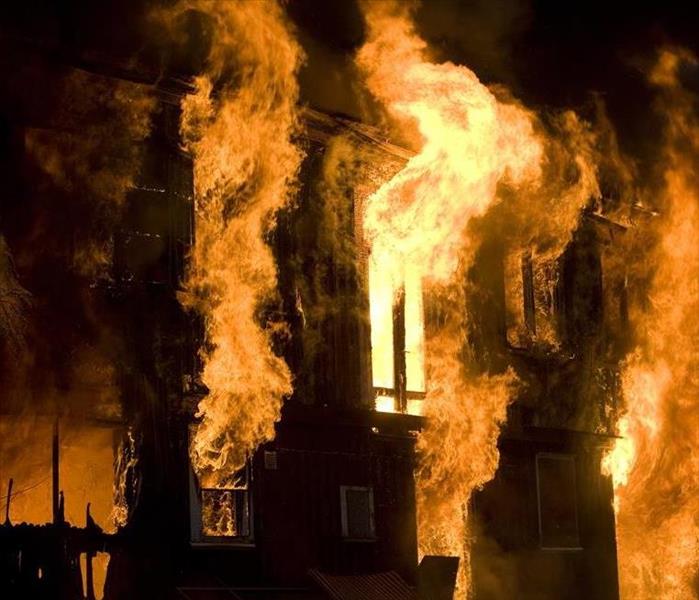 Take into account the Most Common Fire Causes and avoid Fire in your Black Forest, CO house.
Take into account the Most Common Fire Causes and avoid Fire in your Black Forest, CO house.
There are many potential causes of house fires. Homeowners can learn ways to prevent a home fire by becoming familiar with the most common reasons that fires start.
Most Common Fire Causes
Fires can be caused by disasters or system failures. However, they are often caused by everyday activities. These are some of the most common causes of fires.
1. Cooking
The top cause of house fires is unsupervised cooking. While it may be tempting to put your food on the stove and head to the living room to watch TV, this is not a good idea. Stay in the same room as your food while it cooks. If you need to do something else, ask another adult to keep an eye on the food or turn the heat off until you can come back. Set a timer when you are cooking food that takes a long time so that you don't forget about it.
Keep a residential fire extinguisher in the kitchen and learn how to use it. Remember to never throw water on grease fires. Instead, smother the fire with a non-flammable lid, sheet pan, baking soda or salt. If a fire damages your kitchen, consider contacting a fire remediation company in Black Forest, CO to do fire cleaning.
2. Heating Equipment
Space heaters are another common cause of a house fire. If you use a space heater, position it so that it does not come in contact with flammable materials, such as laundry, curtains, furniture or blankets. Do not run space heaters unattended. If you need to leave the area where the heater is located, turn it off and unplug it. Avoid placing space heaters where they can easily be knocked over.
Furnaces can also cause fires if they do not function properly. Have your furnace inspected once per year.
3. Faulty Wiring
Faulty wiring can cause a fire if the wires get too hot or generate sparks that catch other materials on fire. Watch for signs that your wiring doesn't work properly, such as lights that dim when you are using appliances, frequently blown fuses or tripped breakers and only being able to run one appliance at a time.
4. Smoking
Smoking can cause fires when people fall asleep with lit smoking materials in their hands or mouths or discard smoking materials improperly. You can reduce the risk of fires caused by smoking materials by using only fire-safe cigarettes. Smoke only outside your home.
Keep smoking materials out of the reach of children. Use a sturdy, deep ashtray and keep it away from anything flammable. Do not discard cigarettes in vegetation or other flammable materials. Douse cigarette butts in sand or water before throwing them out. Never smoke around anyone who uses medical oxygen.
Be cautious with e-cigarettes. Battery failures can cause explosions. Do not leave e-cigarettes unattended while charging.
Residential fires can be a safety hazard and result in severe property damage. Educating yourself and your family about the most common reasons a home fire may start can help you reduce the risk that a fire may occur.
Avoid the Lasting Effects of Fire, Water, and Smoke Damage
10/19/2021 (Permalink)
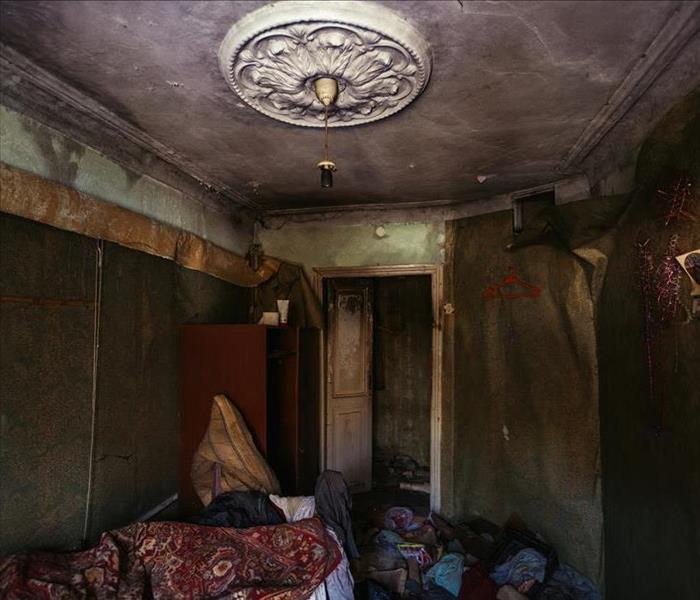 Hire a professional to clean and fix fire and smoke damage in your Black Forest, CO, home.
Hire a professional to clean and fix fire and smoke damage in your Black Forest, CO, home.
A fire in your Black Forest, CO, home is an emotional experience that continues to affect you and your family for months after the flames are gone. This is because serious damage takes place within a very small amount of time. In addition to anything that is burned directly, you have to face water, soot, and smoke damage. The steps you take once it's safe to re-enter your home affect how well the cleanup and repair process is completed.
How To Recover From Fire, Water, and Smoke Damage
One of the first things you need to consider is how to proceed without putting yourself, your helpers, and your home at further risk. Avoid some of the most common hazards after a fire:
- Transferring soot and ash from one part of the home to another
- Putting holes in weakened structural materials
- Lifting heavy, waterlogged items without support
- Exposing your home to natural elements or intruders
Contacting the right professionals is one of the best things you can do before you can clean up and make repairs. These phone calls should include calls to your insurance provider, utility companies, and a local fire and smoke cleaning and reconstruction company.
Hire Experienced, Reputable Professionals
There are several important reasons to hire a professional cleaning firm. These experts perform a thorough assessment of the damage, including sticky, acidic soot damage. If there's an immediate concern about rain or snow, professionals are quick to tarp up holes in the roof and secure entryways. Additionally, cleanup experts plan the most efficient strategies for removing anything with smoke damage. This is a crucial step in preventing the lingering odor of smoke from reminding you of a frightening experience.
Professional cleaning crews have the experience, training, equipment, and supplies necessary to ensure a job well done. Why is this important? After a fire moves through your home, several substances pose a serious risk to your home. The water and chemicals used to put out the flames, for example, get under carpets, inside the walls, and into the attic. Cleanup experts know how and where to track down potential mold growth, so they can treat it before mold damage occurs. The soot that spreads during a fire offers another good example. This sticky material contains acid, chemicals, metals, and dust. Once it settles on the surfaces of your home, soot begins to deteriorate the surface. Experts take steps to prevent spreading this contamination and use specialized cleaning supplies for removal.
Avoid Causing Further Damage
There are several things you can do before professionals arrive. This includes removing as much debris as possible, opening doors and windows for healthy ventilation, and spreading sheets or drop cloths on the floor in high traffic areas. Work closely with experts for more tips on the steps you can take to protect your property.
The work required to recover from the fire, water, and smoke damage that has affected your home often feels overwhelming. When you involve professionals in this process, you don't have to shoulder that burden alone. The experience and knowledge that experts bring can help you feel more confident about the road ahead.
Dealing With Fire and Water Damage After a House Fire
8/21/2021 (Permalink)
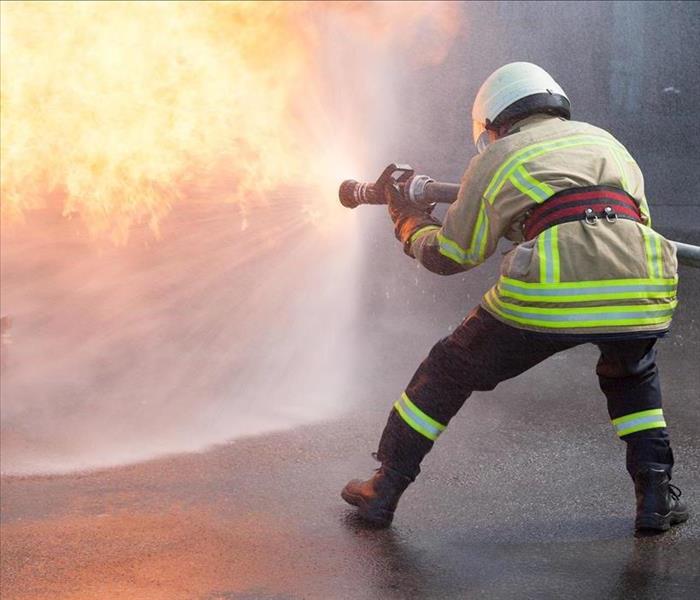 The cleanup after fire damage is a long process. Hire a professional team to help you to deal with it.
The cleanup after fire damage is a long process. Hire a professional team to help you to deal with it.
When flames break out in your Black Forest, CO, home, there's no question that fire damage will follow. However, many homeowners are surprised to learn that damage from water is also a common issue after home fires. As firefighters work to put out the blaze, they may use hundreds of gallons of water. Fortunately, cleanup and repair professionals have experience dealing with fire, smoke, and water damage:
Secondary Damage Prevention
One of the first things that cleanup crews may do after a fire is boarding up any holes in the ceilings and walls. This is done to protect your vulnerable home from exposure to rain, extreme weather, and trespassers. In addition to securing your home, these professionals will assess the damage to determine the best course of action for cleanup and restoration.
Removal of Damaged Goods and Materials
When it's safe, you may help throw out and haul away fire-damaged items. Although you may want to save what you can, there are four things you should always get rid of after a fire:
- Food
- Medications
- Toiletries
- Clothing
If you have questions about how to safely dispose of these items, reach out to experts at the fire department or the cleanup and restoration company.
Cleaning and Disinfection
This step is crucial to ensuring the wellbeing and safety of your family. Once any rubble and ruined items have been cleared out, it's time for thorough cleaning and disinfection. Cleanup experts have professional-grade products to use, including personal protective gear, equipment, and disinfectants.
Mold Prevention
In a home that is already vulnerable because of fire damage, a lot of additional harm can be caused by water from fire hoses. Mold growth is a common issue after a fire hose has sent gallons of water into the home. Professionals inspect for signs of mold and take steps to prevent mold spores from settling into water-affected areas.
Damage Repair
If floors, ceilings, drywall, and furnishings survived the fire, they may still have soaked up a lot of water. This can lead to warping, stains, and structural weakness. Cleanup and repair professionals will inspect the inside and outside of the home for signs of damage and then determine what can be repaired and what must be replaced. This part of fire recovery should be left to the professionals because weakened areas in your home could collapse, causing further damage or harm to people. Your insurance company may recommend a cleanup company to ensure that repairs are done safely and correctly.
Electrical and Plumbing Repairs
These are two areas of work that should also be tackled by professionals because of the potential for further damage. Frayed wiring could lead to new fires and damaged plumbing could cause gas leaks or more water damage.
Final Touches
With major repairs and reconstruction nearly complete, professionals will make sure that there's no lingering moisture in the air. Fans and dehumidifiers are often used to ensure that there are no hidden pockets of humidity behind the walls or between floors.
Recovery from a home fire takes time, especially as professionals must address both fire and water damage. Once these steps are complete, however, you can return to your home with confidence that it is once again clean and safe.
Changing Your Fire Alarm Battery, and Other Safety Information
8/17/2021 (Permalink)
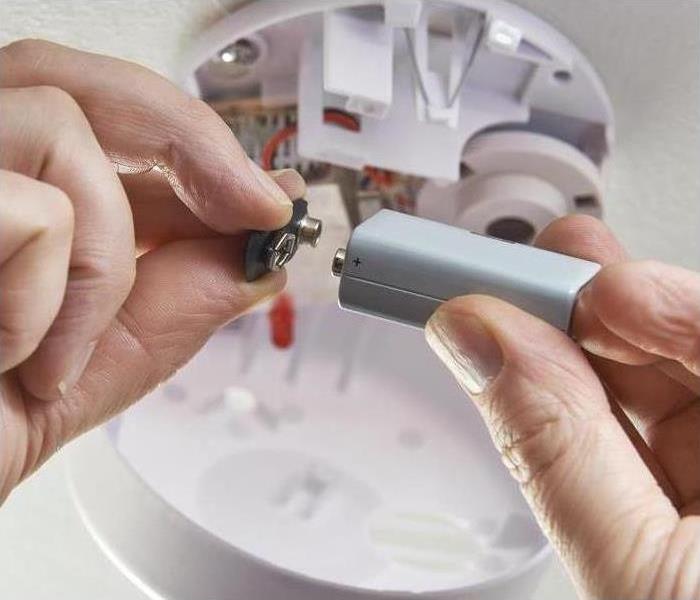 Your home should have an alarm in each bedroom, outside each sleeping space, and on each level of the home.
Your home should have an alarm in each bedroom, outside each sleeping space, and on each level of the home.
Did you know that U.S. fire departments respond to an average of one house fire every 88 seconds? Between 2012 and 2016, house fires caused 11,679 injuries and 2,560 deaths, which amounts to approximately seven deaths by house fire per day. The fire damage cost homeowners roughly $6.5 billion. A working smoke alarm can go a long way toward keeping residents safe, but the problem is, many homes either lack fire alarms or are equipped with alarms that don't work. Below are a few stats to support this assertion:
- 38% of deaths by house fire occurred in situations in which there was no fire alarm present.
- Three out of five house fire deaths occurred in situations in which the home did not have a working smoke detector.
- When a home has working fire alarms, the risk of death is cut in half.
You can avoid danger by arming yourself with basic fire safety and alarm knowledge.
Average Fire Alarm Lifespan
The average lifespan on a new model smoke alarm is eight to 10 years, which means you don't need to replace the unit for quite some time. However, just to be safe, check the manufacturing date on the back of the unit. Even if it has not been eight to 10 years since the manufacturing date, test your smoke detector once a month to make sure it works.
Fire Alarm Battery Life
Again, test your alarm once a month to ensure the battery and unit work. After one year, replace the battery, even if testing reveals the unit still works. It's better to be safe than sorry.
Fire Detector Placement
If you're like most Americans, you have just one or two fire alarms in your home. This is not sufficient. Assuming you have a two-story, three-bedroom home, your house should have five alarms in total.
Now that you boosted your smoke alarm knowledge, update your fire safety education. Talk to your Colorado Springs, CO fire damage restoration team for more safety tips.



 24/7 Emergency Service
24/7 Emergency Service











